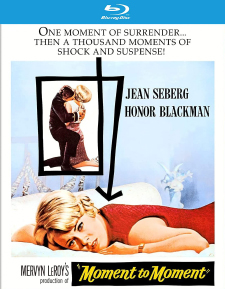Moment to Moment (Blu-ray Review)

Director
Mervyn LeRoyRelease Date(s)
1966 (April 11, 2023)Studio(s)
Universal Pictures (Kino Lorber Studio Classics)- Film/Program Grade: B-
- Video Grade: B+
- Audio Grade: A-
- Extras Grade: B
Review
Universal had a big hit with Charade (1963), the Cary Grant-Audrey Hepburn romantic thriller co-starring Walter Matthau that was directed by Stanley Donen, scored by Henry Mancini and written by Peter Stone. In its wake, the studio produced a number of films clearly influenced by that success, including Mirage (1965), written by Stone and co-starring Matthau; Arabesque (1966), directed by Donen, co-written by Stone, and scored by Mancini; and Moment to Moment (also 1966), again scored by Mancini, and like Charade set in the French Riviera.
Moment to Moment is the weakest of these, though not bad. The pacing is sluggish, the 108-minute film longer than it needs to be and, quite unlike Charade, most of it was filmed on Universal soundstages in California rather than on location in France. For the production an enormous exterior-set was constructed—two adjacent houses and their street out front. The set is moderately impressive, but the movie unfolds like a filmed stage play. Some footage was shot on location in France, but there’s an overuse of process shots and the Universal backlot.
Kay (Jean Seberg), the American wife of psychiatrist-on-sabbatical Neil Stanton (Arthur Hill), calls out to next-door neighbor and best friend Daphne (Honor Blackman) for help. Kay has just shot a man, his lifeless body lying on the kitchen floor.
In flashbacks Kay explains that with her husband away on a long lecture tour across Europe, lonely Kay’s life was brightened by a chance encounter with an American naval ensign, Mark Dominic (Sean Garrison). Kay and Mark inexorably become emotionally attached over the next several days, and after briefly giving in to her desires Kay has buyer’s remorse, immediately regretting her decision to sleep with Mark. Feeling used, Mark becomes upset, they quarrel, and Mark is accidentally shot with a small handgun kept by Kay’s housekeeper.
Panic-stricken, Kay enlists Daphne’s help to dump the body into a ravine, Kay anonymously calling the police about the corpse. However, when four days pass with nothing about the body’s discovery in the newspapers, Kay nervously returns to the scene of the crime, her return there noted by Inspector DeFargo (Grégoire Aslan). Suspecting Kay of the deed, he begins interviewing her as well as Daphne, with her husband’s return just days away.
The screenplay by longtime MGM scribe John Lee Mahin and Alec Coppel, based on the latter’s story Laughs with a Stranger, is alternately clever and sloppy, with one big plot twist and an interesting resolution to the story. The burgeoning romance between Kay and Mark is believable because of its methodical build-up, the two drawn to one another in ways that are unusually plausible. When Kay begins to realize what’s happening to them she gently tries to break things off, but circumstances keep pulling them back together.
What doesn’t work at all is Mark’s out-of-the-blue outburst of violence when Kay realizes she’s made a terrible mistake, that she loves her husband and feels terrible that she’s betrayed him. Mark’s extreme reaction is so completely at odds with the gentle, polite sailor the audience has gotten to know for the first 40 minutes of film that it really comes out of nowhere.
Further, the plot twist, while a surprise (well, a surprise for those not paying too close attention), depends on a wild contrivance that’s like something out of a television daytime drama. On its own terms it works, the drama shifting to Kay trying to hide her brief fling from her husband after his return, he enlisted by sly DeFargo to analyze the crime from a psychological perspective, partly to keep pressure on his chief suspect. If all this sounds a little vague, it’s because I’m trying to keep this review as spoiler-free as possible.
With the exception of Lilith (1964), Jean Seberg was mostly based in France doing French language films, and thus didn’t carry the marquee weight of an Audrey Hepburn or Sophia Loren. Likewise, Honor Blackman was long-established in Britain but little-known in the U.S. outside of Goldfinger (1964), the Bond series catching fire in the U.S. just as Moment to Moment went into release. Sean Garrison had been kicking around in small parts in movies and on television since 1958, but gets an “and introducing” credit here. He’s handsome enough in a white bread, mid-‘60s way, but lacking in charisma and obviously limited as an actor.
Kino describes its Blu-ray as offering “a new 2K restoration of the film,” but the 1.85:1 widescreen transfer looks just okay. The image only intermittently comes to life, much of it looking rather soft and bland. Charade, from a few years before, adopted a similar soft-focus visual style, but that film looks great on Blu-ray. The DTS-HD Master Audio (2.0 mono) fares a little better, and optional English subtitles are provided. Region “A” encoded.
Extras include a new audio commentary by critics Howard S. Berger and Nathaniel Thompson, and an unusual trailer. With no big stars and the film largely stuck in that single set, the trailer (2:49) instead emphasizes behind the scenes footage of Henry Mancini’s recording session of the film’s soundtrack, the narrator (Dick Tufeld) playing up Mancini’s recent hit title songs. Both the feature film and trailer end with “When in Southern California Visit Universal City Studios” ads.
Moment to Moment is a bit too staid and static, but it builds enough steam in its second half to ultimately be mildly entertaining.
- Stuart Galbraith IV

